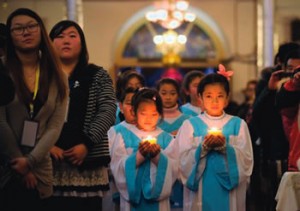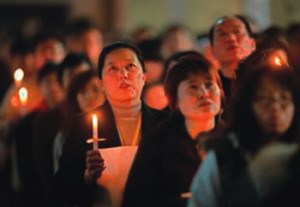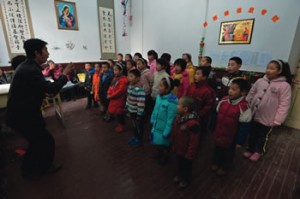The Catholic faith in mainland China — continued
Pastoral Care
Normal pastoral care is essentially centred on the sacraments ( Eucharist, reconciliation, last sacraments). At the level of the family or the village Christian life is communal, but few communities of faith exist, and it is hard to develop a personal faith. In the Catholic villages the strongest Catholics gather morning and evening for prayers. If the village has a priest, daily Mass is well-attended. The Catholics are very attached to devotions, especially the recitation of the Rosary, or the way of the Cross, and meditation on the lives of the saints, but also, recently, Eucharistic adoration which is growing rapidly including perpetual adoration in some parishes. Lay people are very keen on taking part in formation courses of every sort, in particular Bible study. But they are often seriously short of books, equipment and well-trained leaders. In certain places, priests or nuns trained in other countries maintain more consistent formation courses, using group dynamics, accompaniment, and a rich community life. During the Year of Faith, many dioceses are organising formation sessions, and insisting on the use of the Catechism of the Catholic Church, and especially in the more condensed form of its compendium.
The progress of evangelisation
In the matter of evangelisation, the traditional way of thinking sees it as the concern of the priests and the nuns. But many members of the clergy do not sense the urgency of the mission and content themselves with looking after the baptised. Further, in face of a very rapidly changing society, a lot of priests do not know how to respond to the new questions posed by, in particular, the younger generations, who are more educated and open to modernity. In comparison, the nuns are often more involved and in the front line in evangelisation.
When good formation is offered to lay people, along with an awakening of the missionary awareness of the baptised, the local community can show itself to be extremely missionary, not hesitating to go knocking from door to door to speak about Christ. Certain business owners have even transformed their factories into ‘Catholic villages’, with a chapel, a priest associated with it, and most of the workers progressively baptised.
But it is especially by the crosses that they wear around their necks, the pious pictures that they have in their houses or vehicles, the quality of their lives and so on that Catholics witness ‘passively’ to the Gospel. The Chinese being pragmatic people, Chinese Christians easily get involved in charitable activities and service work in the city. It’s not uncommon to see groups of parishioners tidying up the village, visiting elderly people and the sick, etc. It is often this visible form of witness which attracts non-Christians, who are moved by a faith in action and who want to share a similar way of life (often with a limited knowledge of the faith).
The newly-baptised are often very active in charitable works, and carry out a strong witness in the sight of non-christians: the changes in their lives speak more loudly than beautiful homilies.
Changes and opportunities for the future
The Christian life is often centred on prayers and the sacraments. Many elderly Catholics do not know how to pass on the faith to the new generations, who often live in another world. In many ways, the Church in China is still pre-Vatican II, and the elderly Christians who lead the communities have had difficulty in changing their ways of thinking. Many of the prayers are still in an old form of Chinese which the young people or the newly-baptised do not understand.
The one-child policy has had important consequences for the life of the Church, in particular a marked decrease in vocations (at the end of the 1990s there were nearly 2,000 seminarians in the whole of China, today there are about 600 – as many as in France). In the cities the children are overloaded with various educational activities, even on Sundays, and rarely take part in Church activities, which are seen as ‘non-profitable’: they have to learn English, the violin, dancing, etc, so as to be better ranked and have a better chance of getting a place at a university and a better paid job later on.
The lack of formation of lay people as well as of the clergy, the conflicts and divisions at the heart of communities, the bad example of certain members of the clergy, the restrictions imposed by the religious policy of the government, the rapid changes in society (materialism, consumerism, individualism, the break-up of families etc) all represent enormous challenges for the Church in China. But perhaps the most basic challenge is the link between faith and daily life.
But as is shown by the double Chinese character for the word ‘crisis’ - weiji - which includes the characters meaning ‘danger’ and ‘opportunity’, the crisis which presently Chinese society is going through, and the Church with it, can be seen as full of opportunities. In this context of more and more exacerbated materialism, in a society becoming more and more complex, many young people are looking for a meaning in their lives and are turning towards the Church. They are not satisfied with the standards of happiness vaunted by modern Chinese society, which seem to them to be empty. In the same way as China is basically open to new things in every sphere, the young generations are very open to the ‘new thing’ of Christianity. It is impressive to measure how much short formation sessions (provided both in China and Hong Kong) can get local animators (priests and lay-people) going, with quick and impressive results. Many dioceses have got involved in building formation centres in which sessions in catechesis and in spirituality are provided. The internet has become, for the Church, an extraordinary way of evangelisation, formation, and distributing information. The changes and initiatives which have taken place over the last 30 years, especially the last ten, have been impressive. Certain student communities, set up only a few years ago (since 2005) now involve hundreds of young people, with a whole range of programmes responding to all their needs, including the needs of those who have entered professional life or who are preparing for marriage.
The Church in China is evolving, in the wake of China as a whole, from a rural Church to an urban and more educated Church, from an elderly Church to a young Church. The generous commitment of the young people, among whom new sorts of vocations are being born, is in the process of renewing the local Church, which is at once a great promise and a huge challenge.
Article from “Missions etrangeres de Paris” No 485, July - August 2013, Translated by Brian Quin, s.m.


 Entries(RSS)
Entries(RSS)